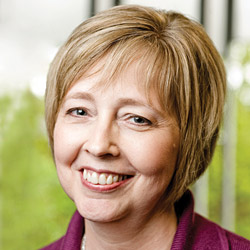From the Senior Editor
Educating the Educators — and a Thank You to President Eaton

I grew up among educators. My father was a school superintendent, my mother a kindergarten teacher. Many of our extended family members and friends were — and are today — teachers or school administrators. In fact, several learned their profession at Seattle Pacific.
As long as I can remember, life has moved to the rhythms of school. For me, a year still begins in autumn with the opening of school and the turning of the leaves.
But the ultimate legacy of my upbringing is a love for learning and an appreciation for the tremendous rewards and advantages a quality education brings.
In this issue of Response, we ask how all children in America can experience the benefits of a quality education. Helping us frame the discussion are New York Times columnist David Brooks, broadcast journalist Tavis Smiley, and education historian Diane Ravitch. Helping us imagine the
future of education are SPU faculty members and graduates who are using research and innovation to improve schools.
Seattle Pacific has a 90-year history of preparing some of the most sought-after teachers and school administrators in the region. The School of Education and its alumni focus on serving the underserved, strengthening urban schools, closing the “achievement gap” — and helping to make
schools work for all children. Who better to participate in an “education renaissance,” as Brooks describes it?
The role of the university in strengthening education at all levels is critical, says SPU President Philip Eaton. He speaks of “the flourishing of all God’s children” as the ultimate purpose for the work of Seattle Pacific — and of Christian higher education as a whole. In his 2011 book Engaging
the Culture, Changing the World, President Eaton argues that “the Christian university stands the best chance in our time to articulate and model a vision of human flourishing that will make the world a better place for all God’s children.” The image of Seattle Pacific educating educators — who then educate children — makes his point even more powerful.
***
As President Eaton prepares to retire on July 1 after 17 years, there are many voices from the campus community and beyond paying tribute to his achievements. I’d like to offer him a special thank-you for his longtime role as publisher of Response.
Several years ago, the Response staff brought a proposal to President Eaton for a magazine that broke from the traditional alumni magazine model. We envisioned a publication that involved alumni and other friends around the world in a wide-ranging exploration of ideas and stories related to faith and culture — an “engaging of the culture” in print — utilizing the extensive resources of the Seattle Pacific academic community.
At the time, it seemed like a risky venture. But President Eaton has always loved big ideas in support of SPU’s vision. He wholeheartedly endorsed the proposal and has been our biggest champion as we have implemented it.
Thank you, President Eaton, for thinking big, for taking risks, for providing both freedom and support. Thank you for leading with vision and integrity. Most of all, thank you for your abiding love for SPU. We will miss you.
Jennifer Johnson Gilnett
